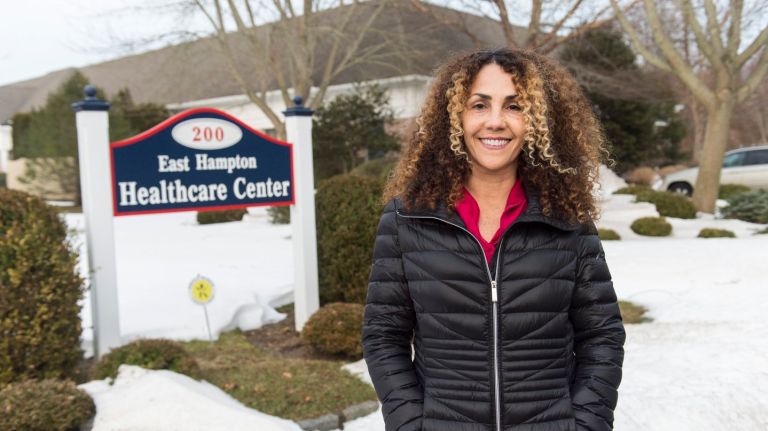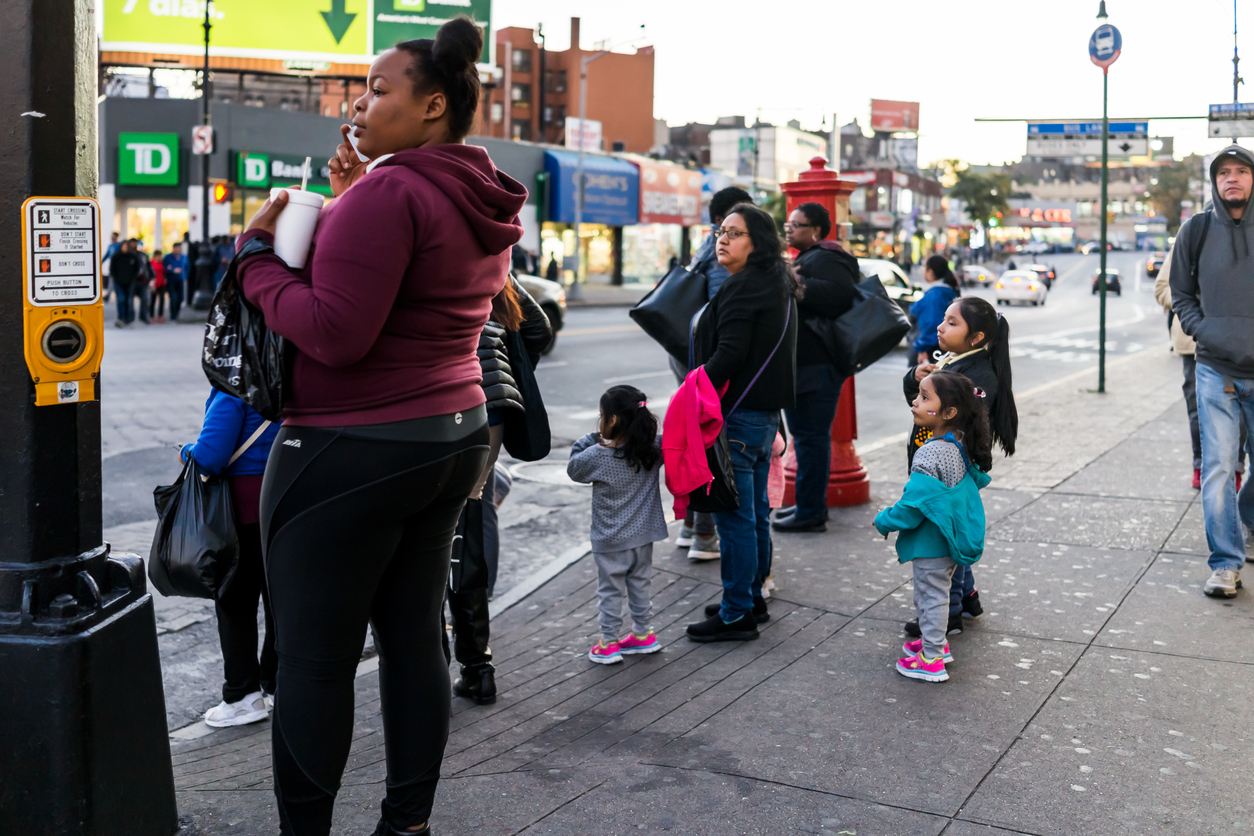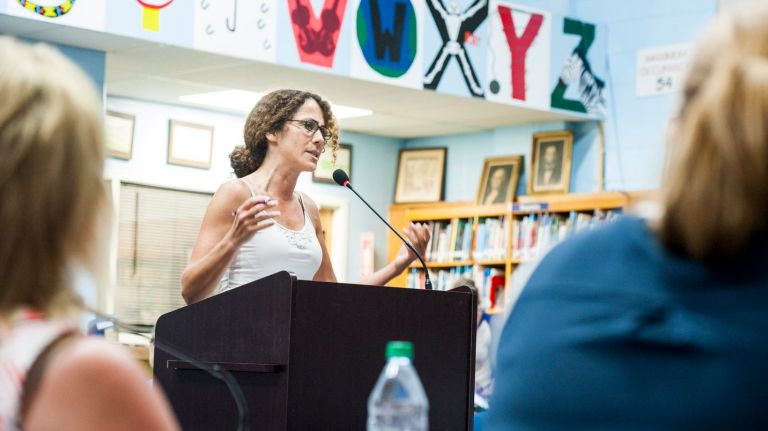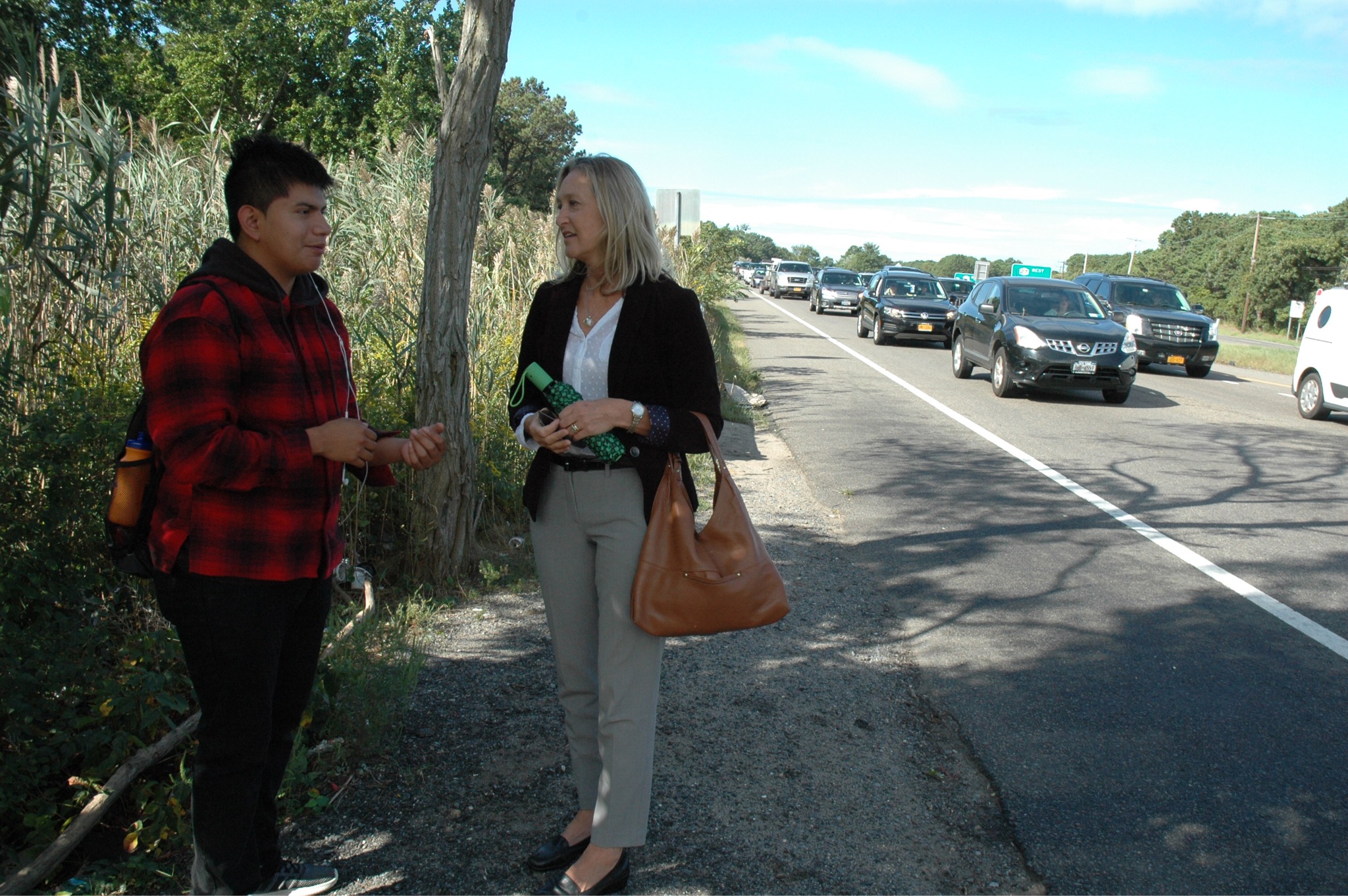
Share On Social!
Minerva Perez hates bullies.
In elementary school, Perez did not like when bullies picked on her friends. She became their bodyguard.
Today, Perez is standing up to a modern bully—transportation barriers.
Limited access to public transportation is bullying Latino families into skipping medical appointments, instilling big fears of deportation, and jeopardizing health in Suffolk County, N.Y. (19.5% Latino).
Perez is taking action as leader of Organización Latino-Americana of Eastern Long Island.
She helped create a unique free van ride program that bridges transportation gaps. It also gives her an advocacy platform to improve public transportation at the local level.
How did Perez do it? Is it working?
A 3-Hour Bus Ride
Getting around in Suffolk County isn’t easy.
Many parts are remote. There is lots of traffic. And sporadic public transportation.
 In fact, it takes a 3-hour bus ride—compared to 15-minute car trip—to reach a main clinic with primary, pediatric, and cancer doctors in one part of East Hampton in Suffolk County.
In fact, it takes a 3-hour bus ride—compared to 15-minute car trip—to reach a main clinic with primary, pediatric, and cancer doctors in one part of East Hampton in Suffolk County.
“I didn’t know it was that bad” at the time, Perez said.
It’s worse for Latinos.
A few years ago, Perez became executive director for Organización Latino-Americana. The nonprofit group promotes social, economic, cultural, and educational development for regional Latinos.
They started local workshops to get an idea of community needs.
Transportation was a top issue.
Latino families in the eastern-county towns of Southhampton and East Hampton already face high rates of poverty and low insurance coverage. More than 67% of Latinos participate in federal food assistance. The unintended pregnancy rate for Latinas (30.5%) is double that of non-Latinas. The county has one of the worst ozone pollution rates in New York. People here struggle with heart disease. They don’t get preventive care.
“[Latinos here are] just working so hard, living the best life they can live. And yet not being respected, not being valued, being taken for granted, being exploited, being put in danger,” Perez said. “These are not the things that should be happening. Especially not in one of the richest areas in the entire globe.”
Many Latinos share one car. A worker who uses that car may not return home until late in the evening.
Police are increasingly enforcing rules on driving without a license. Many undocumented residents avoid driving. Get caught more than once, you can face jail time. You may then get detained or deported, Perez said.
Plus the county recently cut 10 bus lines. Suffolk County’s budget has less than 1% for buses.
“People have no other access to get to and from jobs, which puts food on the tables. You start talking to people in the healthcare world, and they’re seeing decreasing people come in for their medical appointments,” said Perez, noting people then rely on emergency room visits. “That’s how you’re handling health, simply because there’s no access to basic public transportation?”
Perez said that’s not acceptable.
“Right now, Latino members in our community need [our help to] kick a few doors open, start a conversation that for whatever reason maybe hasn’t been started,” she said. “Bring people in.”
A Surprise Donation
Perez wanted to do something.
Fortunately, Perez’s organization got two big donations in 2017.
A local couple donated their 2005 seven-seat minivan. Another couple donated $15,000 to pay for vehicle insurance, registration, and the hiring of a driver.
With that, they created Organización Latino-Americana “Emergency Medical Transportation Service.”
The Free Transportation Program
Alma Tovar is the driver and manager of the Emergency Medical Transportation Service.
Tovar drives Latino men, women and children, who can’t drive themselves, to doctor appointments. She takes people to pediatric checkups, cancer treatments, physical therapy, and obstetricians and gynecologists, Perez said and 27east.com reports.
Tovar transports up to 15 people a week.
The ride program is going so well that Organización Latino-Americana has built a database of properly vetted volunteer drivers who can provide rides when Tovar is not available.
It’s helping Latinos overcome their fears and a lack of public transportation.
“Once we’ve got someone that we’re transporting, we’re transporting them over and over again, because they realize [they can trust us],” Perez said. “We definitely see the impact in their lives. The fact they feel the support is out there. That there’s an organization that’s taking the needs seriously.”
Gaby Cabrera,the organization’s new civic engagement coordinator, said the program is building community resilience.
“It’s OK to accept help. It’s OK to ask for help, because we’re a safe space,” Cabrera said.

Perez first envisioned the program ending in April 2018.
But, as of August 2018, the program is going strong. That’s because the need remains—and local advocacy is needed.
“We want to ensure that people are getting to their medical appointments safely,” Cabrera said. “If you have a little baby with a fever of 102 and is crying … the last thing you want to do is be on a bus for three hours. So we want to try to ease the pressure in the community.”
“But we also make a statement that, hey, this is a real problem,” Cabrera added. “We actively bring it to Suffolk County legislators to say, ‘This is what we’re seeing this situation’s urgent, you guys need to act.'”
Advocating for Transportation Improvements
The ride program enables Perez to engage in advocacy to improve local transportation.
“It is giving us some traction that we really need,” Perez said. “To not just being pointing our fingers saying, ‘There’s a problem there, someone go fix it.’ No, we’re making the effort, doing everything we can.”
Businesses and employers are coming to the table. People are researching local transportation needs and solutions.
Even the volunteer ride providers are sharing stories with elected officials.
“We’re going to scream from that out from the top of our lungs that this is what’s not being met as a result of not having public transportation,” Perez said.
The screams are reaching decision-makers.

Suffolk County legislator Bridget Fleming admires Organización Latino-Americana’s free ride service. But hopes the county can refine its bus routes to better serve the community, Newsday reports.
Fleming created a new committee to evaluate the current bus system and find ways to improve routes and ridership.
In 2017, Fleming got money to study the feasibility of installing sidewalks and bus shelters along a dangerous road in Southampton, according to 27east.com.
Perez said they plan more advocacy in transportation and other Latino health issues.
“There’s this gap within the area of healthcare advocacy. People don’t know how to advocate for themselves. The vulnerable Latinos in our community absolutely feel that they are voiceless,” Perez said. “And we are going to be setting up workshops that focus on advocating for self, advocating for a loved one, an elderly person, or a child.”
“This community is a beautiful community and a wonderful mix of people from all over. Spanish-speaking countries and islands, non-Latinos, Shinnecock Nation, African American. There’s no reason why we have to see one or two or any group fall, and fail, and be decimated and be desecrated.”
By The Numbers
25.1
percent
of Latinos remain without health insurance coverage
This success story was produced by Salud America! with support from the Robert Wood Johnson Foundation.
The stories are intended for educational and informative purposes. References to specific policymakers, individuals, schools, policies, or companies have been included solely to advance these purposes and do not constitute an endorsement, sponsorship, or recommendation. Stories are based on and told by real community members and are the opinions and views of the individuals whose stories are told. Organization and activities described were not supported by Salud America! or the Robert Wood Johnson Foundation and do not necessarily represent the views of Salud America! or the Robert Wood Johnson Foundation.



